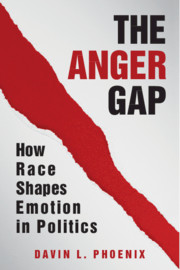Book contents
- The Anger Gap
- The Anger Gap
- Copyright page
- Dedication
- Contents
- Figures
- Tables
- Preface
- 1 Anger in Black and White
- 2 Anger (Mis)Management?
- 3 The Anger Gap and Turnout in American Politics
- 4 From Black Anger to Black Activism
- 5 The Racial Enthusiasm Advantage in Politics
- 6 The Anger Gap, beyond Black and White
- 7 On Dreams Deferred and Anger Inhibited
- Bibliography
- Index
6 - The Anger Gap, beyond Black and White
Published online by Cambridge University Press: 30 October 2019
- The Anger Gap
- The Anger Gap
- Copyright page
- Dedication
- Contents
- Figures
- Tables
- Preface
- 1 Anger in Black and White
- 2 Anger (Mis)Management?
- 3 The Anger Gap and Turnout in American Politics
- 4 From Black Anger to Black Activism
- 5 The Racial Enthusiasm Advantage in Politics
- 6 The Anger Gap, beyond Black and White
- 7 On Dreams Deferred and Anger Inhibited
- Bibliography
- Index
Summary
Chapter Six extends the argument beyond the black-white binary by exploring the degree to which the racial anger gap and enthusiasm advantage are exhibited by Asian and Latina/o Americans. This chapter illuminates how features that distinguish these respective racial groups—specifically narratives that paint these groups as politically dormant or ostracized—shape their emotional responses to politics in a manner similar to African Americans. Returning to data from the CMPS, I reveal that the anger gap and enthusiasm advantage are not limited to African Americans. Both Asian American and Latina/o American respondents exhibit significantly less anger than their white counterparts. And the linkage between anger and political participation is far weaker for these groups relative to white Americans. Similar to African Americans, pride is strongly associated with political participation for both groups of color. Further, this chapter reveals the unique association between people of color’s anger expressions and their perceptions of intergroup racial solidarity. Asian, Latina/o and black respondents all demonstrate a remarkable consistency between their expressions of anger and their support for policy stances indicating interracial coalition. This relationship is not exhibited by white respondents. Conversely, expressions of pride from these groups surface both interracial and intra-racial tensions.
Keywords
- Type
- Chapter
- Information
- The Anger GapHow Race Shapes Emotion in Politics, pp. 195 - 243Publisher: Cambridge University PressPrint publication year: 2019

